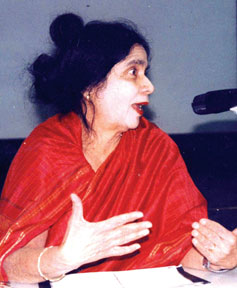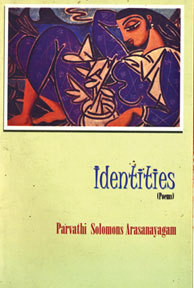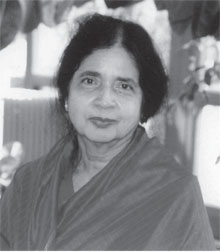|
A poetic symbiosis of two poetesses:
A glimpse at Jean and Parvathi ’s poetry on motherhood
By Dilshan BOANGE
There is a saying –‘The hand that rocks the cradle is the hand that
rules the world’, which speaks of the pivotal role of motherhood and the
figure of maternity in the human world.
 |
|
Jean Arasanayagam |
The songs and verses composed in praise of motherhood its virtues,
and the emotional landscapes that one finds this theme taking shape into
various forms of expressions are manifold.
Focus
In this article I would like to focus on two poems on the theme of
motherhood by two Sri Lankan poetesses who are bound by the most sacred
of human bonds –parental and filial ties. The selected poems are
‘Mother’ by Jean Arasanayagam published in Reddened Water Flows Clear
and ‘My Mother’ by Parvathi Solomons Arasanayagam published in
Identities.
The interesting perspective would be in this investigation to see how
much of a filial and maternal thread can be detected and how the two
poetesses conceive the topic of motherhood in the two selected pieces.
‘Mother’ by Jean Arasanayagam
Firstly, let us take an overview of the poem ‘Mother’ by the senior
Arasanayagam. The prosaic composition runs a narrative heavy with
imagery and descriptivism that situates the reader’s mind in a sequence
of places. The poem seems to drift between Jean’s own experiences of how
she saw motherhood in her own mother form a point of observation as well
as experience as a child.
And then there is also a latterly developing element of fantasy that
seems to dwell on the sweetness of ambiguity that leaves the reader
wondering if the poetess in fact is trying to take us into her own world
of experience or if it’s her imagination built on the myriads of
experiences she would have had as a child.
The feeling one gets when reading this poem ‘Mother’ is that it is a
woman who now reaches deep into her wealth of memories about her own
mother yet isn’t afraid to let grains of fantasy and imagination shape
the landscape.
Binding propinquities
The propinquities that bind the mother–daughter relationship have
been endearingly described in the poem that really reaches deep into the
moments that make the child realise that there isn’t any other who can
comfort a child like a mother can. Let’s consider for example, the
following lines –
 When I was ill she propped me among pillows When I was ill she propped me among pillows
Placed an ice –bag on my forehead and fed me with gruels,
Syrups of crystal sugar from the kithul flower
And juice of the sour orange, placed in my hands
The little knotted bundle of kalu duru seeds...
Another interesting aspect of this poem is how it brings out a very
strong vein of the westernised household which would be characteristic
of a Burgher family.
And thereby the image of the mother as situated in the sphere of
domesticity brings out the idea that motherhood and the role of the
mother takes a very traditional and personal space in the eyes of Jean
whose perceptions were ones that saw the mother as the pillar who keeps
the spirit of the household alive and therefore becomes the spine of the
family. The supporting role of the mother as the one who keeps the
economy managed on a day-to-day basis is highlighted in this poem in a
way that it subtly underscores the injustice that may be done to the
mother since in the general picture of how society is framed, the woman
is always made to take a backseat and at best be seen in a ‘supporting’
role. And by bringing out this point of argument in her poetic
expressionism one may suggest that Jean is firing a spark of rebellion
against the mainstream status quo!
Comfort zone to children
The motherly figure in Jean poem speaks of one who bears much burdens
emotionally while being s comfort zone to her children.
“She did not talk of her dreams as I did, lent her
Ears to our prayers as we knelt at her knees...”
Perhaps this mother was one who didn’t believe in the purpose of
speaking of her own dreams because perhaps to her the greatest joy would
have been ensuring the well being of her children? And the poet no doubt
is deeply grateful to what she has been privileged to find in a mother
to whom she had meant the world. This mother of Jean A’s voice becomes
someone who isn’t merely the household figure but renders into a persona
that symbolises a great depth of imaginations that lace the poet’s own
experiences and understandings of fiction and fantasy. The end
culminates towards this effect where boundaries become blurred of what
may be biographical and fictional. Truly it takes an imaginative vein
pulsing with the need to express feelings through images and
descriptivism that says perhaps in a symbolic sense that to the poet her
mother is something more than the ordinary!
 “And stories of her own life, there were many “And stories of her own life, there were many
That she told me, stories dark with the
Thunder of death and fear but it was
Always me whom she led out of danger
When the high wind rose and the boat
Capsized in the lagoon lifted me high
Above the water and then again
When one dark night she fled with me
Across the fields clutching me, an infant in her
Arms;”
Bridging gaps between fantasy and reality
Perhaps the poet is garbing in a fictionalised moment of intense
actions a personal feeling she wants to give expression to. And through
such means perhaps the poet is seeking to bridge the gaps between
fiction and fantasy when she attempts to conjure the image of the mother
from being the ordinarily mundane to ‘heroine’ beyond the domestic
threshold. If it all unfolded in the privacy of the poetess’s mind as
she sought to give expression to the idea of ‘Mother’ then it bears its
full span of realness to her. After all the right of a poet to explore
his or her own imagination to find expressions is not constricted by
generics of scientific or documentary writing.
Parvathi’s poem
Moving from Jean poem about the image of motherhood lets focus on a
poem by her daughter Parvathi Arasanayagam titled ‘My mother’ from her
book Identities. In stark contrast to her own mother’s poem ‘Mother’
Parvathi’s piece comes as a verse that situates her own mother very much
in her mundane reality but the magic of her inner being the selflessness
of her ways delivers an endearingly enchanting picture of a daughter’s
loving narrative of her mother, brought through simple uncomplicated
language.
 |
|
Parvathi Solomons
Arasanayagam |
In ‘My mother’ one finds a very true to everyday life depicted in
relation to Jean’s routine as a mother coming home after performing her
role as a school teacher, another ‘life’ detached from her role as
‘mother’. But to Parvathi the role Jean can hold seems to be ‘mother’
and it is an essential in defining Jean. It seems the premise in which
Jean is placed in the lines of her daughter clearly shows how any other
roles she may perform outside the realm of the poetess’s world takes a
secondary place to that of motherhood.
The familiar environs
One of the striking features is how the poet builds the subject of
the poem, its focus and its flow of imagery bound unalterably with Kandy
and its surrounding areas. The environs described give the reader a
scenic picture of serenity and harmony which seems to complement the
inner being of the subject of the poem –Jean Arasanayagam, the poetess’s
mother. In this sense one could say that the poetess has devised an
approach to suggest the innerness of her mother is reflected in certain
ways through the environs around her.
Consider for example the opening lines:
“My mother walks beside the yellowing paddy fields,
Stalks thickening with ripening grain,
The wind sifting through those beaded
Strands.”
Between imagery and metaphor
One may suggest perhaps the environs described serve a dual purpose.
Firstly it sets the tone of harmony by taking the reader into a rich
imagery that many Sri Lankans can relate to and secondly it may be a
subtle metaphor to bespeak of the emotional landscape the interiority of
Jean A, b this I suggest that the goldenness of the ripened paddy may be
symbolic of how a daughter sees her mother as being a vital source of
sustenance and regarded with deep veneration while also admired for the
outer beauty it shines forth. The delights she fills her bag with to
bring home to her children –Halapa, sesame sprinkled biscuits, jaggery
hoppers, imbul kiribath, shows how her arrival is made more special to
the poet who seems at such a juncture to fly to her inner sense of
recalling those moments like a child.
The role of motherhood in this poem of Parvathi’s speaks in very
direct form what touches her by the example of her own mother about whom
she says –
“Walking early my mother listened to
Birdsongs of sadness and hope.”
The afore lines could be both literal or/and metaphoric with the
latter being accomplished if the birdsongs are to be understood in the
light of sounds of children playing. To a person described in the verse
as Jean the sounds of children can possibly come as endearingly as
birdsongs.
The fortitude of a mother
Like in the poem of her mother titled ‘Mother’ Parvathi A too sees
fortitude in her mother’s role as a spinal column holding up the burdens
of a daily household economy.
 |
|
Jean Arasanayagam |
“Prepared sandwiches for the tuckshop
To supplement a meagre income and
Buy clothes at sales for her daughters.”
In the above lines the observations of the poet as a child seem to
culminate as a tribute to her mother’s painstaking efforts to be a
pillar of strength to her children. Though the lines describe something
very simple and unassuming its depth in striking a chord in the heart of
the poet cannot be undermined. Surely looking back at such moments
Parvathi must feel her mother should be gazed at with ardour as that to
a heroine.
And perhaps these imageries conjured by the two poet duo of mother
and daughter on the theme of motherhood would resonate with many who may
find grains of their own personal experiences, perceptions, conceptions
about who a ‘mother’ is, laced in the lines crafted by Jean Arasanayagam
and her daughter Parvathi whose gift of giving a living voice to human
emotions finds its root within their own world of feelings about people
who shaped them.
|

